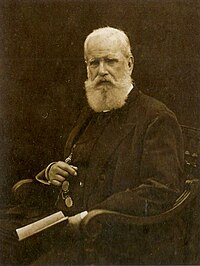Decline and fall of Pedro II of Brazil
| Pedro II | |
|---|---|

Emperor Pedro II of Brazil at age 61, 1887: a monarch who grew tired of his crown.
|
|
| Emperor of Brazil | |
| Reign | 7 April 1831 – 15 November 1889 |
| Coronation | 18 July 1841 |
| Predecessor | Pedro I |
| Former Emperor of Brazil | |
| Exile | 15 November 1889 – 5 December 1891 |
| Born |
2 December 1825 Palace of São Cristóvão, Rio de Janeiro |
| Died | 5 December 1891 (aged 66) Paris, France |
| Spouse | Teresa of the Two Sicilies |
| Issue | |
| House | House of Braganza |
| Father | Pedro I of Brazil |
| Mother | Maria Leopoldina of Austria |
| Signature | |
The decline and fall of Pedro II of Brazil occurred over the course of the 1880s, with the underlying factors accumulating and coming increasingly into focus after 1881. This period paradoxically coincided with a time of unparalleled economic and social stability and progress for Brazil, during which the nation had achieved a prominent place as an emerging power within the international arena.
The roots of the collapse of the monarchy can be traced as far back as 1850, upon the death of Pedro II's youngest male child. From that point onward, the Emperor ceased to believe in the monarchy as a viable form of government for Brazil's future, as his remaining heir was a daughter. Although constitutionally permitted, a female ruler was considered unacceptable by both Pedro II and the ruling circles. This issue was deferred for decades, during which the country became more powerful and prosperous. So long as the Emperor enjoyed good health, the matter of succession could be ignored.
From 1881 on, Pedro II's health began failing. He gradually withdrew from public affairs as time passed. Weary of being tied to a throne which he doubted would survive his death, he persevered out of duty and because there seemed no immediate alternative. Nor did his daughter and heir, Isabel, exhibit a desire to assume the crown. Both, however, were overwhelmingly beloved by the Brazilian people, who still supported the monarchy. The indifference towards the Imperial system by the Emperor and his daughter allowed a discontented republican minority to grow more audacious and to eventually launch the coup that overthrew the Empire.
Pedro II may be considered a rare instance of a head of state who, despite being overwhelmingly beloved by his people, despite international admiration and acclamation, despite having been instrumental in driving forward major liberal social and economic reforms, despite overseeing a period of outstanding prosperity and influence during a reign covering nearly six decades, and despite being considered a highly successful ruler to the end, was ultimately subjected to overthrow and exile. The republican revolution which replaced the Empire led to decades of disruption and dictatorship.
During the 1880s, Brazil continued to prosper and social diversity increased markedly, including the first organized push for women's rights. The country had greatly changed in the five decades since Pedro II's accession to the throne. The liberalism adopted by successive Government cabinets favored private initiatives and resulted in decades of economic prosperity. It "had an economy that was rapidly developing in 1880s". Brazil's international trade reached a total value of Rs 79.000:000$000 (see Brazilian currency) between 1834 and 1839. This continued to increase every year until it reached Rs 472.000:000$000 between 1886 and 1887 (an annual growth rate of 3.88% since 1839). Brazilian economic growth, especially after 1850, compared well with that of the United States and European nations. The national revenue, which amounted to Rs 11.795:000$000 in 1831, rose to Rs 160.840:000$000 in 1889. By 1858, it was the eighth largest in the world. To give an idea of the economic potential of the country during the Empire, if "it had been able to sustain the level of productivity achieved in 1780 and managed to increase exports at a pace equal to that verified in the second half of 19th century, its per capita income in 1950 would be comparable to the average per capita income of the Western European nations".
...
Wikipedia
